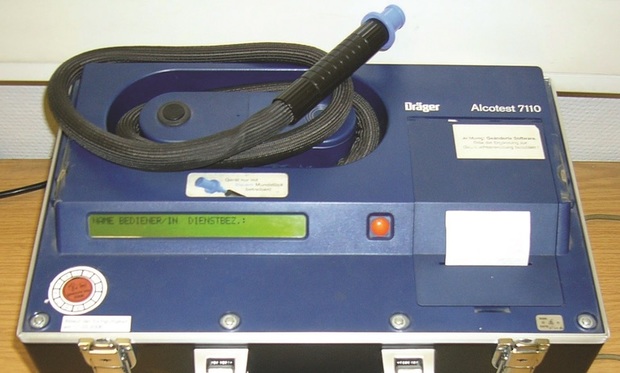Justices to Weigh Special Master's Report on Alcotest Accuracy
The Supreme Court will have the final say, but the 218-page report by retired Appellate Division Judge Joseph Lisa, the product of a month of hearings with six expert witnesses, is expected to carry a lot of weight.
May 08, 2018 at 10:30 AM
4 minute read

The attorney general's attempt to relax rules for calibrating drunken driving testers is facing uncertain prospects after a special master's report said the proposed revisions would compromise reliability.
After charging a state trooper with falsifying records for allegedly skipping a step when calibrating Alcotest devices, the state petitioned the Supreme Court to find that step was unnecessary. The step allegedly skipped was mandated by the Supreme Court in State v. Chun in 2003.
But on May 4, after a yearlong study, a special master in State v. Cassidy said the proposal to eliminate a check of the temperature of simulator solutions with a special thermometer would undermine the reliability of tests.
The Supreme Court will have the final say, but the 218-page report by retired Appellate Division Judge Joseph Lisa, the product of a month of hearings with six expert witnesses, is expected to carry a lot of weight.
“We're hopeful that the Supreme Court adopts the recommendation of Judge Lisa. It's a very well-reasoned report,” said Eatontown lawyer Michael Hobbie, who represents defendant Eileen Cassidy in the case.
The state charged state police Sgt. Marc Dennis with falsifying records in September 2016, accusing him of skipping a step in the mandatory calibration process when he checked Alcotest machines in police departments. It identified 20,667 people who provided evidentiary breath samples on machines calibrated by Dennis.
Meanwhile, Cassidy was charged with drunken driving in Spring Lake municipal court. Her charges were based on an Alcotest machine calibrated by Dennis. She pleaded guilty but later moved to vacate her plea after learning about the charges against Dennis.
Elie Honig, director of the state Division of Criminal Justice, anticipating other challenges, moved before the Supreme Court for direct certification of Cassidy's case and appointment of a special master. The special master would address whether failure to use a National Institute of Standards and Technology-traceable thermometer undermined the scientific reliability of the Alcotest.
But Lisa said the state failed to prove that skipping the NIST thermometer step in the calibration process “does not undermine and call into question the good working order of the Alcotest instrument.” Skipping the thermometer step “removes from the process a substantial and essential safeguard, the magnitude of which reduces the reliability of the device to a level that is less than sufficiently scientifically reliable to allow its reports to be admitted into evidence,” he wrote.
Dennis' charges came on the heels of another evidentiary scandal at the Division of Criminal Justice, where a lab technician at a state police laboratory in Little Falls, New Jersey, in December 2015 was accused of falsifying test results for suspected marijuana, stirring turmoil in thousands of criminal cases.
In the Cassidy case, representatives for the attorney general said that, even though it was seeking a general elimination of the requirement for thermometer calibration of simulator solutions, it would still carry out that step, said Jeffrey Gold, a Cherry Hill, New Jersey, defense lawyer who participated in the Cassidy case on behalf of the amicus curiae state bar association. He takes issue with the state's effort to change the rules in light of Dennis' misconduct.
“The fact that the state wanted this relief, to me, was nefarious. I didn't think that was just at all,” Gold said.
While the state estimates more than 20,000 people were affected by Dennis' actions, the actual impact might be far less, said Gold. While past defendants convicted of drunk driving might gain the right to reopen their cases in light of the improper procedures, not all will follow through, he said.
Peter Aseltine, a spokesman for the Division of Criminal Justice, said in an email, “we are reviewing the report and will be preparing to address this before the Supreme Court. We don't have any further comment.”
This content has been archived. It is available through our partners, LexisNexis® and Bloomberg Law.
To view this content, please continue to their sites.
Not a Lexis Subscriber?
Subscribe Now
Not a Bloomberg Law Subscriber?
Subscribe Now
NOT FOR REPRINT
© 2025 ALM Global, LLC, All Rights Reserved. Request academic re-use from www.copyright.com. All other uses, submit a request to [email protected]. For more information visit Asset & Logo Licensing.
You Might Like
View All

'You Became a Corrupt Politician': Judge Gives Prison Time to Former Sen. Robert Menendez for Corruption Conviction
5 minute read
‘The Decision Will Help Others’: NJ Supreme Court Reverses Appellate Div. in OPRA Claim Over Body-Worn Camera Footage
5 minute read
Trending Stories
- 1Second Judge Blocks Trump Federal Funding Freeze
- 2Crypto Hacker’s $65 Million Scam Ends in Indictment
- 3Trump's Inspectors General Purge Could Make Policy Changes Easier, Observers Say
- 4Supporting Our Supreme Court Justices in the Guardianship Part
- 5'Erroneous Rulings'?: Wilmer Asks 4th Circuit to Overturn Mosby's Criminal Convictions
Who Got The Work
J. Brugh Lower of Gibbons has entered an appearance for industrial equipment supplier Devco Corporation in a pending trademark infringement lawsuit. The suit, accusing the defendant of selling knock-off Graco products, was filed Dec. 18 in New Jersey District Court by Rivkin Radler on behalf of Graco Inc. and Graco Minnesota. The case, assigned to U.S. District Judge Zahid N. Quraishi, is 3:24-cv-11294, Graco Inc. et al v. Devco Corporation.
Who Got The Work
Rebecca Maller-Stein and Kent A. Yalowitz of Arnold & Porter Kaye Scholer have entered their appearances for Hanaco Venture Capital and its executives, Lior Prosor and David Frankel, in a pending securities lawsuit. The action, filed on Dec. 24 in New York Southern District Court by Zell, Aron & Co. on behalf of Goldeneye Advisors, accuses the defendants of negligently and fraudulently managing the plaintiff's $1 million investment. The case, assigned to U.S. District Judge Vernon S. Broderick, is 1:24-cv-09918, Goldeneye Advisors, LLC v. Hanaco Venture Capital, Ltd. et al.
Who Got The Work
Attorneys from A&O Shearman has stepped in as defense counsel for Toronto-Dominion Bank and other defendants in a pending securities class action. The suit, filed Dec. 11 in New York Southern District Court by Bleichmar Fonti & Auld, accuses the defendants of concealing the bank's 'pervasive' deficiencies in regards to its compliance with the Bank Secrecy Act and the quality of its anti-money laundering controls. The case, assigned to U.S. District Judge Arun Subramanian, is 1:24-cv-09445, Gonzalez v. The Toronto-Dominion Bank et al.
Who Got The Work
Crown Castle International, a Pennsylvania company providing shared communications infrastructure, has turned to Luke D. Wolf of Gordon Rees Scully Mansukhani to fend off a pending breach-of-contract lawsuit. The court action, filed Nov. 25 in Michigan Eastern District Court by Hooper Hathaway PC on behalf of The Town Residences LLC, accuses Crown Castle of failing to transfer approximately $30,000 in utility payments from T-Mobile in breach of a roof-top lease and assignment agreement. The case, assigned to U.S. District Judge Susan K. Declercq, is 2:24-cv-13131, The Town Residences LLC v. T-Mobile US, Inc. et al.
Who Got The Work
Wilfred P. Coronato and Daniel M. Schwartz of McCarter & English have stepped in as defense counsel to Electrolux Home Products Inc. in a pending product liability lawsuit. The court action, filed Nov. 26 in New York Eastern District Court by Poulos Lopiccolo PC and Nagel Rice LLP on behalf of David Stern, alleges that the defendant's refrigerators’ drawers and shelving repeatedly break and fall apart within months after purchase. The case, assigned to U.S. District Judge Joan M. Azrack, is 2:24-cv-08204, Stern v. Electrolux Home Products, Inc.
Featured Firms
Law Offices of Gary Martin Hays & Associates, P.C.
(470) 294-1674
Law Offices of Mark E. Salomone
(857) 444-6468
Smith & Hassler
(713) 739-1250






